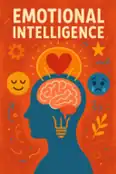By: Jennifer Bailey, LCSW & RDT
Emotional intelligence is “the ability to read our instinctive feelings and those of others. It also allows us to understand and label emotions as well as express and regulate them”, as defined by Dr. Marc Brackett, founding director of the Yale Center for Emotional Intelligence and a professor in the Yale Child Study Center.
Being able to recognize and manage your emotions helps you manage life stressors, relationships, and the unexpected. However, emotional intelligence has been an area where the Black community has struggled. In times of crisis, recognizing one’s emotions is not the priority; overcoming the threat is. Looking at the history of Black people in America, slavery, Jim Crow, systemic racism, poverty, and police brutality can be experienced as threats. As a result, emotional intelligence in the Black community remains largely uncharted territory. To build our emotional intelligence, we must first understand its basics.
Basics of Emotional Intelligence
According to PositivePsychology.com, there are 5 components of emotional intelligence: Self-awareness, self-regulation, motivation, social skills, and empathy. Although all of these components have their importance and value, the main focus of this article will be on the components of self-awareness and self-regulation.
Self-awareness
PositivePsychology.com defines self-awareness as “the capacity to recognize and understand emotions and to have a sense of how one’s actions, moods, and the emotions of others take effect.” This also means being able to label emotions correctly and understanding the link between our emotions and their influence on our actions. Self-awareness also includes being open to and learning from new experiences and ideas.
Self-regulation
Self-regulation refers to how you express your emotions, cope with change, manage conflict, handle challenging situations, and understand the impact of your actions on those around you.
To build your emotional intelligence, the first step is to label what you are feeling; this is the self-awareness component mentioned earlier. Psychologist Robert Plutchik identified 8 core emotions.
Each emotion is paired with its opposite: fear-anger, joy-sadness, trust-disgust, and surprise-anticipation. With emotional intelligence comes the understanding that each emotion serves a purpose, and if a given emotion is denied acknowledgment and expression, there can be negative outcomes. Emotional intelligence has an impact on how we function across environments.
Emotional intelligence across settings
Mental Health America reports that individuals with high emotional intelligence “can identify how they are feeling, what those feelings mean, and how those emotions impact their behavior and, in turn, other people.”
Emotional intelligence at home
High emotional intelligence at home allows us to have better and deeper connections with our families. As parents, it allows us to set a positive and healthy example of how to manage stress and communicate effectively. High emotional intelligence in the home can allow you to make more thoughtful decisions as a spouse.
Emotional intelligence at work
David Harris, assistant basketball coach at Northern Kentucky University, discusses the role of emotional intelligence in his line of work within the world of basketball. “The players and coaches who aren’t aware of their emotions and lack emotional intelligence are the ones who are very moody and have different approaches every day. And in sports, where consistency is so important, that stunts the growth for yourself and teammates.”
In the workplace, Strong emotional intelligence can result in strong skills in conflict management, communication, and leadership. According to Mental Health America, “Employees who can self-regulate their emotions are often able to avoid making impulsive decisions – they think objectively before they act.” It can also build resilience in the workplace, helping Black employees navigate code-switching, microaggressions, and burnout.
Harris goes on to say, “Being able to control your emotions in the world of sports as either an athlete or coach is huge. Athletes are wired and motivated to WIN at all costs. When in reality, you will fail a lot and even at times way more than you succeed. When you don’t win a championship, you ‘fail’. So that means only 1 team can ‘succeed’. Can you handle your emotions after a failure/loss? It’s an everyday cycle that you have to deal with. The players and coaches that can move on from a bad drill, day, or even season are the ones that see more growth and actual joy in their life.”
The outcomes associated with high emotional intelligence can benefit both our personal and professional lives. This isn’t a new concept, so why should the Black community be trying to incorporate this in daily life now?
Emotional intelligence: Why now?
As the awareness of productive mental health practices increases, the Black community continues to lag. The stigma around accessing mental health support is one of the biggest barriers. Conversations about our emotions, feelings, and moods are a starting point in breaking down the barrier of stigma. This also allows us an opportunity to heal from generational trauma, learning more effective ways of navigating the hardships of life while giving us access to experience joy.
Takeaways
- 5 Components of Emotional Intelligence
- Self-awareness
- Self-regulation
- Social skills
- Empathy
- Motivation
- 8 core emotions
- Anger
- Fear
- Sadness
- Disgust
- Surprise
- Anticipation
- Joy
- Trust
- Benefits of Emotional Intelligence
- At the workplace, strong emotional intelligence can result in strong skills in conflict management, communication, and leadership.
- At home, it can allow you to make more thoughtful decisions as a spouse and parent.
- Why emotional intelligence now?
- The stigma around accessing mental health support is one of the biggest barriers. Conversations about our emotions, feelings, and moods are a starting point in breaking down the barrier of stigma.
Jennifer Bailey is a wife, mother of three, and a therapist. She is a Licensed Clinical Social Worker (LCSW) and Registered Drama Therapist (RDT).




